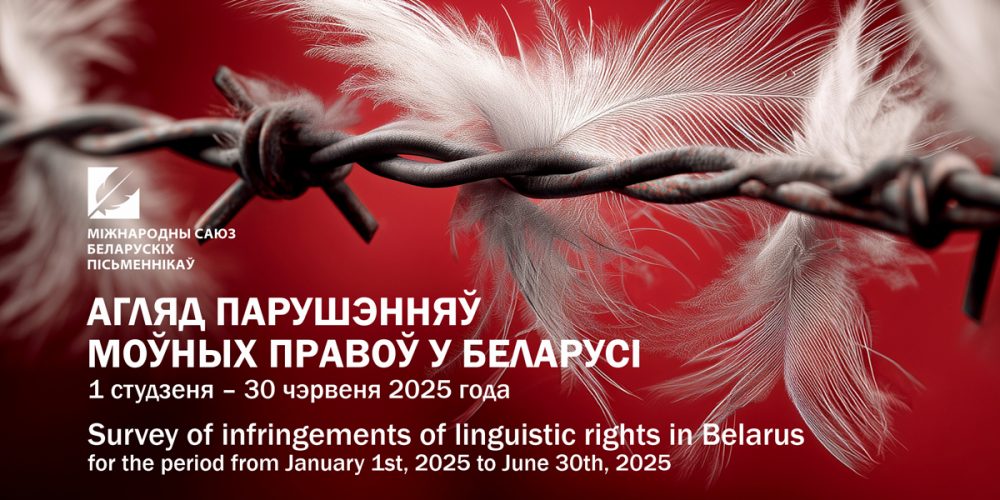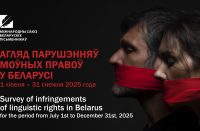The first half of 2025 was marked by an even greater intensification of Russification in Belarus — both at the ideological and institutional levels. Events within the country and steps taken by Russia indicate a coordinated policy of cultural and linguistic expansion aimed at ousting the Belarusan language from all spheres of life. This trend is becoming increasingly systemic and aggressive.
On June 5th, 2025, Vladimir Putin held a meeting of the Council for the Implementation of State Policy in the Field of the Russian Language and the Languages of the Peoples of Russia, at which the need to popularize the Russian language outside the Russian Federation and to preserve the Cyrillic alphabet in the public space was announced among the priorities. Belarus is openly mentioned as a zone of influence. And these are not just declarations – there are 27 “compatriots” organizations that work in the country, financed through the Russian Embassy in Minsk, as well as four “Russian Houses” – in Minsk, Brest, Hrodna, and Homiel, which are branches of the federal agency “Rossotrudnichestvo” – an instrument of the Kremlin’s “soft power” that is under EU and US sanctions.
As the historian Paviel Cieraskovic emphasizes, the presence of these structures threatens the state of the Belarusan language and national identity. In his turn, the researcher Paul Barkouski notes that about 40% of Belarusans are under the constant information influence of the Russian mass media, and the Russian cultural content dominates the Belarusan market.
The official Belarusan-state policy continues to support this expansion. The Belarusan language remains marginalized in the education system: less than 10% of school pupils study in Belarusan, the number of schools with Belarusan as the language of instruction is decreasing, and Belarusan textbooks are being squeezed out. There have been examples of censorship in educational materials: references to the Battle of Vorsa are being removed, and the figure of Kastus Kalinouski is being discredited (DW, June 2024).
The strategy of information warfare is also changing: if Russia previously acted through local elites, now it is directly pouring financial and information resources into Belarus. According to Alaksiei Lastouski, this approach is aimed at undermining historical memory and forming loyalty to the “Russian World”, including through the concept of the “genocide of the Soviet people”, which replaces the Belarusan national narrative.
The sphere of higher education is also open to Russian influence: in 2025, Belarus has allocated 1,000 budget places for Russian applicants, and also plans to exchange about 50 professors between the countries.
Against this background, the criminalization of any activity that has to do with the Belarusan language and culture is being continued. Signs in the Belarusan language, Belarusan-language publications, educational and environmental initiatives are declared “extremist”, and their organizers are being persecuted. It creates an unprecedented situation when a nation becomes a target of its own state’s policies, and a language is an object of extermination.
Our organization’s monitoring of language rights infringements documents the aftermaths of this policy and seeks to show the wideness of the problem — both in the education and mass media sectors, as well as in public spaces, courts, correctional facilities, and political processes. Our analysis is not only an attempt to document the consequences of Russification, but also a response to the Belarusan community’s need for visibility, solidarity, and resistance.
The “International Union of Belarusan Writers” association continues to monitor the situation of the Belarusan language in the country and records all cases of discrimination against the language and its speakers for subsequent documented assessments and international protection.
During the first half of 2025, we have found the following cases of discrimination in open sources of information:
On January 8th, 2025, the pro-government activist Olga Bondareva published a post on social media criticizing Belarusan-language education in rural schools. According to her, teaching in Belarusan allegedly limits the opportunities for graduates to enter technical universities. As an argument, she cited the need to train specialists for the production of dual-use goods, noting, “War is on the doorstep, and there are no specialists”.
On January 10th, 2025, Olga Bondareva criticized the use of only Belarusan on ballots in the presidential election in Belarus. She called this practice “discrimination against the Russian language” and filed a complaint with the Central Election Commission.
On January 16th, 2025, the enterprise “Minsk cold storage facility No. 2”, the owner of the “Radzivillovsky” chain of stores, rebranded and replaced the inscription on the logo from Belarusan to Russian.
On February 1st, 2025, a scientist from Homiel, A. Sakalou, published a study in which he showed that the results of the 2019 population census were artificially coordinated in political interests. According to his conclusions, the authorities overestimated the population and the share of Belarusan speakers (native and language of communication) — including at the expense of national minorities — in order to create the desired picture. In reality, the author notes, the Belarusan language is not supported, there is no full Belarusan-language education, independent publishing houses and cultural projects are being destroyed, and activists are being persecuted.
On February 5th, 2025, the blogger Capitoshka posted a video on TikTok stating that the Belarusan language workbook for grade 2 (authored by Alena Damasievic) was printed with errors and typos. The Ministry of Education responded that the workbook does not have the Ministry’s stamp and is not mandatory for use in education, but promised to conduct an inspection and remove editions with errors from sale.
On February 13th, 2025, on the eve of the 104th anniversary of the birth of the Belarusan writer Ivan Mielez, a memorial sign to the classic of Belarusan literature was installed in the Choiniki city park on the alley “Honorary Citizens of the Choiniki District”. The inscription on the memorial sign is in Russian.
On February 15th, 2025, in an interview with the channel “ChestnOK-LIVE”, the mathematics teacher Tacciana Karpienievic (who left Belarus after being denounced by the pro-government activist O. Bondareva) reported that her familiar Belarusan-speaking colleague was detained during a protest and tortured by GUBAZiK officers – they put his head in the toilet solely for his use of the Belarusan language (video 53:44).
On February 19th, 2025, according to Nasha Niva, on some public transport routes in Minsk, announcements began to be made in Russian instead of Belarusan. At the end of 2024, the pro-Russian activist Olga Bondareva demanded that Minsktrans make announcements bilingual. At the time, the company replied that this was technically impossible. However, new information suggests that the demand has apparently been partially met: Russian-language announcements have been introduced.
On February 21st, 2025, the Human Rights Center “Viasna” published a material dedicated to the Day of the Mother Language, which documented cases of punishment of political prisoners for using the Belarusan language. It is reported that in Mahilou-based colony No. 15, the journalist and researcher Dzianis Ivasyn (sentenced to 13 years and 1 month of imprisonment, recognized as a political prisoner on March 24th, 2021) was repeatedly punished for speaking Belarusan. First, he was placed in a detention center, then in a PKT (chamber-type room; disciplinary cell;), and then transferred to prison No. 1 in Hrodna.
Similar cases were recorded in relation to Volha Majorava (sentenced to 21 years and 6 months of imprisonment, recognized as a political prisoner on April 29th, 2021), who is serving her sentence in prison No. 24 in Zarecca. The former political prisoner Palina Sarenda-Panasiuk, released on February 1st, 2025, spoke about systemic discrimination on the basis of language.
On March 2nd, 2025, the pro-Russian political scientist and Western-Russist Vsevolod Shimov was outraged that the staff of the Sula Historical Park spoke exclusively in Belarusan and refused to switch to Russian. He visited the park with guests from Moscow and openly expressed his dissatisfaction with this language of service.
On March 21st, 2025, the publication “Flagshtok” reported that the “Center for Ensuring the Activities of Budgetary Organizations of the Rahacou District” is conducting a state purchase of fiction for the Rahacou Central District Library named after Uladzimir Karatkievic. For 7 thousand Belarusan roubles, it is planned to purchase 3,475 books — all in Russian. Belarusan books are not purchased even for the library named after the classic of Belarusan literature. The district budget is used to purchase mainly Russian-language children’s publications, such as “Kolobok”, “Tsarevna-lyagushka”, etc.
On April 2nd, 2025, shoppers noticed that confectionery manufacturer Vicba was labeling its products only in Chinese and Russian, completely ignoring Belarusan. This caused outrage among consumers, as labeling in the country’s official language is absent even on products intended for the domestic market.
On April 3rd, 2025, the Telegram channel “My Country Belarus” reported that in Salihorsk, migrants from Africa are being taught exclusively Russian. This is presented as part of a program for their cultural adaptation. The Belarusan language is completely ignored, which indicates the continuation of the Russification policy even in relation to new residents of the country.
On April 7th, 2025, Uladzislau Jefimovic (sentenced on July 7th, 2023, to 3 years and 6 months in a maximum security colony under Art. 361-1 of the Criminal Code – creation of an extremist formation or participation in it, and Art. 361-4 of the Criminal Code – facilitation of extremist activity, released on January 20th, 2025) told the Human Rights Center “Viasna” that in Mahilou-based colony No. 15, it was tacitly forbidden to study a number of languages – Polish, Czech, Latvian, and especially Ukrainian, which was called the “language of the enemy”. Studying English was allowed. The political prisoner said that he had textbooks in Polish and Czech, studied quietly and hid materials under his mattress. When the notebook was found by a colony employee, he was sentenced to 10 days in a solitary confinement cell. Also, according to him, other prisoners who tried to learn Turkish were beaten in the detention center. There were “ESHKO” courses in the colony, but political prisoners were forbidden to use them.
On April 9th, 2025, Alexander Lukashenko signed Directive No. 12 “On the Implementation of the Fundamentals of the Ideology of the Belarusan State”. The document is entirely in Russian. It states that Belarus gained independence only thanks to the presidential form of government, and also promotes a model of formal bilingualism with the de facto dominance of the Russian language.
On April 14th, 2025, the actress Ksienija Kaminskaia of the Kolas Theater in Viciebsk noted in a TikTok video that many of the theater’s actors have poor command of the Belarusan language, which creates difficulties during improvisation on stage when the text is forgotten.
On May 11th, 2025, on the Day of State Symbols of Belarus, a memorial plaque was installed in Biaroza in honor of the President of the Academy of Sciences of Belarus Paviel Horyn (Kalada) at house number 1 on the street that bears his name. Paviel Horyn was arrested by the NKVD and shot on charges of “participation in a counter-revolutionary terrorist organization”. The memorial plaque is written entirely in Russian.
On May 13th, 2025, it became known that, according to the National Statistics Committee, the number of schoolchildren studying in the Belarusan language decreased from 135,523 in 2014 to 88,885 in 2024. At the same time, the number of students studying in Russian increased by 22.6% and reached 991,274 people.
On May 15th, 2025, Natalla (the name is changed for security reasons), a Belarusan language teacher from a small town, told Radio Svaboda that the situation with the Belarusan language in schools remains very poor. According to her, the school where she works is officially considered Belarusan-language, but in practice most teachers teach subjects in Russian. The teacher explains this by the lack of qualified personnel capable of teaching in Belarusan.
On May 21st, 2025, the Telegram channel “My Country Belarus” noticed that the mobile application of the A1 taxi service had a variety of languages available — including Tatar and Abkhaz — but no Belarusan.
On May 27th, 2025, after a break, the program “Journey of an Amateur” returned to YouTube – a video project in which Juryj Zyhamont travels through Belarusan towns, telling about their history, architectural features, local traditions and legends. The program is conducted in Belarusan and softly emphasizes the value of the national cultural heritage. However, the pro-Russian propagandists Grigoriy Azarenok and Vadim Gigin launched a public campaign of harassment and accused the author of anti-state activities.
On May 29th, 2025, the JSC “Pastavy Milk Factory”, in response to an appeal from the human rights defender and language activist Ihar Slucak, reported that it does not plan to label its products in Belarusan, as “there is no space on the packaging”. The company does not have a Belarusan-language version of its website, either, and does not intend to create one, and does not plan any measures to expand the use of the Belarusan language in 2025. Ihar Slucak also received a similar response from the Blik factory in Minsk.
On May 31st, 2025, signs with historical street names appeared on the streets of the historical center of Viciebsk – they are located next to the official billboards. There was no renaming; the initiative was of an informational and cultural-educational nature. However, this caused discontent from the supporter of the “Russian World” Elvira Mirsalimova, who accused the local authorities of “Belarusan patriotism”.
On June 2nd, 2025, the language activist and human rights defender Ihar Slucak published several responses from Belarusan companies regarding the use of the Belarusan language. The JSC “Malaryta Canning and Drying Plant” reported that it labels its products in Kazakh for the Kazakh market, but does not plan to label in Belarusan for the Belarusan market. The “Navahrudak Gifts” branch of the JSC “Lida Dairy and Canning Plant” refused to use Belarusan on its packaging, citing the small size of consumer packaging. The JSC “Lida Shoe Factory” noted in its response that no actions are planned for 2025 to expand the use of the Belarusan language in its activities.
On June 11th, 2025, a Belarusan-speaking woman who wanted to get a job at the “Kids. Treasures of the Nation” children’s development center was denied employment due to her language background. The director of the institution informed her that the center was exclusively Russian-speaking and advised her to look for a job at a Belarusan-speaking children’s center.
On June 18th, 2025, a video of a Belarusan she-blogger who runs her social media channel in Belarusan was met with outrageous comments from users from Russia. They claimed that they did not understand the language of the video, accused the girl of “distorting the Russian language” and advised her to “work on her slang”, despite the fact that she used Belarusan.
On June 22nd, 2025, Radzim Harecki, an academician of the National Academy of Sciences of Belarus, a famous geologist, writer and public figure, a nephew of the classic of Belarusan literature Maksim Harecki, died. After the burial, a cross with an inscription exclusively in Russian was installed on his grave.
The Belarusan language continues to be ousted of the public space, and its speakers are faced with manifestations of discrimination. This survey is not only a recording of the facts, but also an attempt to respond to them: a manifestation of solidarity, a testimony of the truth, and respect for those who have not broken. We will continue this work – both of documentation and resistance.
If you know cases of violations of linguistic rights that were not recorded in this survey, please send them to naszamova@gmail.com
Агляд парушэнняў моўных правоў у Беларусі з 1 студзеня па 30 чэрвеня 2025 году (BY)
Обзор нарушений языковых прав в Беларуси с 1 января по 30 июня 2025 года (RU)







